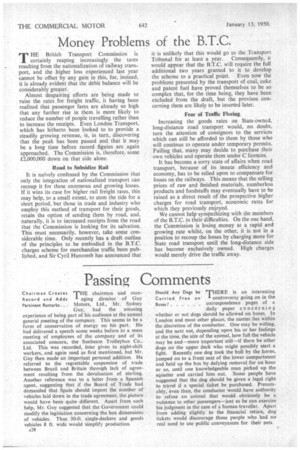Money Problems of the B.T.C.
Page 30

If you've noticed an error in this article please click here to report it so we can fix it.
rr HE British Transport Commission is certainly reaping increasingly the tares resulting from the nationalization of railway transport, and the higher loss experienced last year cannot be offset by any gain in this, for, instead, it is already evident that the debit balance will be considerably greater.
Almost despairing efforts are being made to raise the rates for freight traffic, it having been realized that passenger fares are already so high that any further rise in them is more likely to reduce the number of people travelling rather than to increase the receipts. Even London Transport. which has hitherto been looked to to provide a steadily growing revenue, is, in turn, discovering that the peak has been passed and that it may be a long time before record figures are again approached. The Commission is, therefore, some £2,000,000 down on that side alone.
Road to Subsidize Rail It is naïvely confessed by the Commission that only the integration of nationalized transport can recoup it for these enormous and growing losses. If it wins its case for higher rail freight rates, this may help, to a small extent, to stem the tide for a short period, but those in trade and industry who employ this method of transport for their goods, retain the option of sending them by road, and, naturally, it is to increased receipts from the road that the Commission is looking for its salvation. This must necessarily, however, take some considerable time. Only recently has a draft outline of the principles to .be embodied in the B.T.C. charges scheme for merchandise traffic been published, and Sir Cyril Hurcornb has announced that it is unlikely that this would go to the Transport Tribunal for at least a year. Consequently, it would appear that the B.T.C. will require the full additional two years granted to it to develop the scheme to a practical point. Even now the problems presented by the transport of coal, coke and patent fuel have proved themselves to be so complex that, for the time being, they have been excluded from the draft, but the provisos concerning them are likely to be inserted later.
Fear of Traffic Fleeing Increasing the goods rates on State-owned, long-distance road transport would, no doubt, turn the attention of consignors to the services which can still be afforded to them by those who will continue to operate under temporary permits. Failing that, many may decide to purchase their own vehicles and operate them under C licences.
It has become a sorry state of affairs when road transport, because of its innate efficiency and economy, has to be relied upon to compensate for losses on the railways. This means that the selling prices of raw and finished materials, numberless products and foodstuffs may eventually have to be raised as a direct result of the prospective higher charges for road transport, economic rates for which they previously enjoyed.
We cannot help sympathizing with the members of the B.T.C. in their difficulties. On the one hand, the Commission is losing money at a rapid and growing rate whilst, on the other, it is not in a position to recoup the losses by charging more for State road transport until the long-distance side has become exclusively owned. High charges would merely drive the traffic away.




































































































